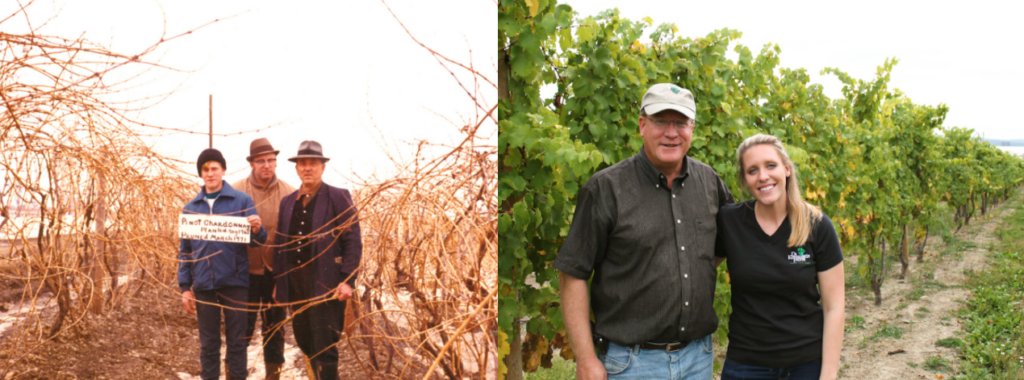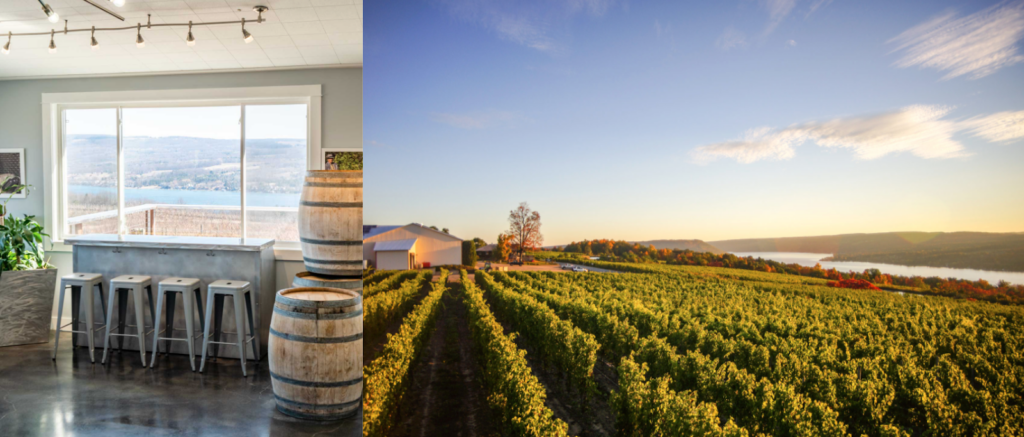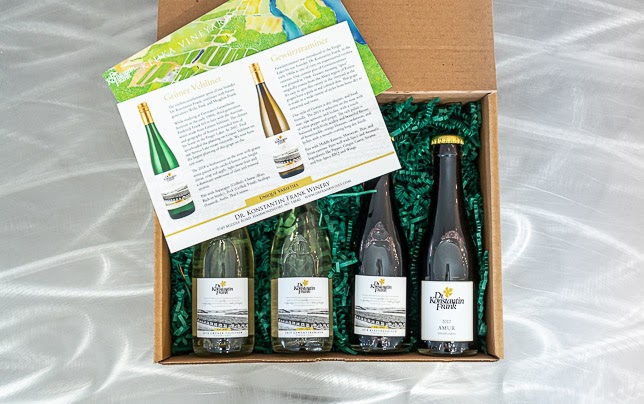When considering how COVID-19 has affected her family’s business, Meaghan Frank doesn’t wonder what would have been; she’s too focused on the future. She does take a moment to genuinely think about what Dr. Konstantin Frank Winery would be doing if there weren’t a global pandemic and seems stumped. “I feel like so much energy and time has been spent thinking outside the box that I don’t even know what we would have done inside the box.”
And of course, because big, forward thinking is in her blood. Meaghan’s great-grandfather, Dr. Konstantin Frank, wrote the blueprint for the wine country you see today. Konstantin’s first Vitis vinifera plantings took root on the western shores of Keuka Lake in 1957, transforming the region as others followed suit. Prior to his influence, winemakers were only growing hybrid grapes with any success. Meaghan’s grandfather, Willy, established one of the region’s first méthode champenoise programs, which is world-renowned today. And her father, Fred (and the current President), has spearheaded growth in acreage, a global market distribution and awards recognition that is unmatched.

The future brings a fourth generation to run the winery. Much like her great-grandfather, Meaghan is a voracious learner, with degrees from Cornell University and the University of Adelaide. She brings expertise in both winemaking and the wine business that is evidenced in her modernization of the family business, all while staying true to its roots. When praised for her accomplishments, she calls it a joint effort: “we have so many great people on our team and everyone has such good ideas. It’s nice to put some of them into action.” You can tell Meaghan loves what she does, and who she does it with.
2020 was a busy year for the Dr. Frank team. In early March, Meaghan was showcasing their wines at a tradeshow in Tokyo. She arrived at home a week before the region shut down but Fred got stuck in Florida through June. “I’ve never felt that much pressure. There was a real fear that we were going to be totally shut down–like not be able to do vineyard work, not be able to bottle or do any production work,” she remembers as running the business would suddenly fall solely on her shoulders for the first time during a pandemic. “Thankfully, we were deemed an essential business, so that really saved us.”
IDEAS INTO ACTIONS
Forced to change, Meaghan began to make plans. They finished remodeling the tasting room, exposing beautiful (and easy to clean) concrete floors. “It’s really clean, sort of modern-ish, lots of stainless steel and concrete.” New bars were built by local sculptor, Sam Kassner.

For their pandemic tasting model, they decided to innovate against the pre-Covid 1886 Food & Wine Experiences. Meaghan explains that they “wanted something themed that would be really fun and also tell our story [because] the education component is so important [to us].” They decided on a Progressive Tasting Experience where groups of six or less rotated through five tasting stations. Each station represented a core part of the Frank story. Guests were welcomed with sparkling, taught about the vinifera revolution, learned about old vines, explored innovative winemaking techniques like using an amphora, and ended with a celebration of the Frank family women. On the way out, guests enjoyed contactless shopping.
By making the tasting experience less transactional, the quality of the interaction heightened. “We saw about a third of the people we would normally see in a season but check values doubled.” But most importantly for Meaghan and the team, 100 percent of the post-visit guest surveys recorded feeling safe.
The winery also introduced at-home tasting kits. The themed selections of four 187ml bottles provided another way for guests to sample a variety of wines. The kits also kept staff working in January 2021, when the winery decided to close voluntarily as a safety precaution. “Honestly, I thought we’d sell maybe 50 and it’d be a fun thing to talk about but we sold 750 in the first five weeks!” As of April 2021, they’ve sold nearly 2000.
Naturally, Meaghan and the team identified the tasting kits as an opportunity to add an educational component–this time from the comfort of your couch. As many have done, the winery will launch Zoom tastings alongside kit purchases in the future. But Meaghan doesn’t want them to feel stuffy. She visualizes them as an opportunity to connect with guests and provide a personalized experience that continues to honor the legacy of her great-grandfather.

FORGING AHEAD
As for what the future holds, Fred has given Meaghan room to have fun and experiment. They reopened in early April with a variety of tasting experiences planned to appeal to a broader audience. Alongside the Progressive Tasting, the winery now offers a standard seated format, and wines available by the glass. As the season continues, guests will see the return of the 1886 Food and Wine Experience, which will be available by reservation only.
Later this month, they’ll launch Eugenia’s Garden. “It is going to be a warm and welcoming space to enjoy a customized flight of wines paired with local cheeses. I have fond memories of visiting my great-grandmother with my siblings and we would spend the afternoons on the swingset amongst the beautiful flowers and gardens,” Meaghan smiles as she remembers growing up spending time in the garden. “We are working with a local designer to ensure Eugenia’s personality and Ukrainian culture is fully captured in the space.”
And alongside Digital Brand Manager Brandon Thomas, Meaghan’s exploring the idea of a walking path with a self-guided audio tour, similar to a museum experience. They envision guests being able to grab a glass of wine on a warm afternoon by the lake. Maybe they stop by the pond or a vineyard block as they learn the history of her family. And most importantly, they enjoy at their own pace.
While Meaghan continues to look forward, she’s intentional in acknowledging her gratitude. She says everyone’s thankful for friendly and flexible visitors who “restored our faith that our staff was going to be safe.” Thankful for lifelong customers who would “call to check in and sometimes place an order, sometimes not. Just checking in. The human element of it was really a welcome surprise.” And they’re thankful–and excited–for a new, younger demographic from drivable locations discovering the Finger Lakes for the very first time. “That was really a blessing,” she says as she thinks about the masked faces she met in 2020. “I hope that people had a really good time.” She smiles as she says this and it’s clear the good time was had by all, and by Meaghan especially.

